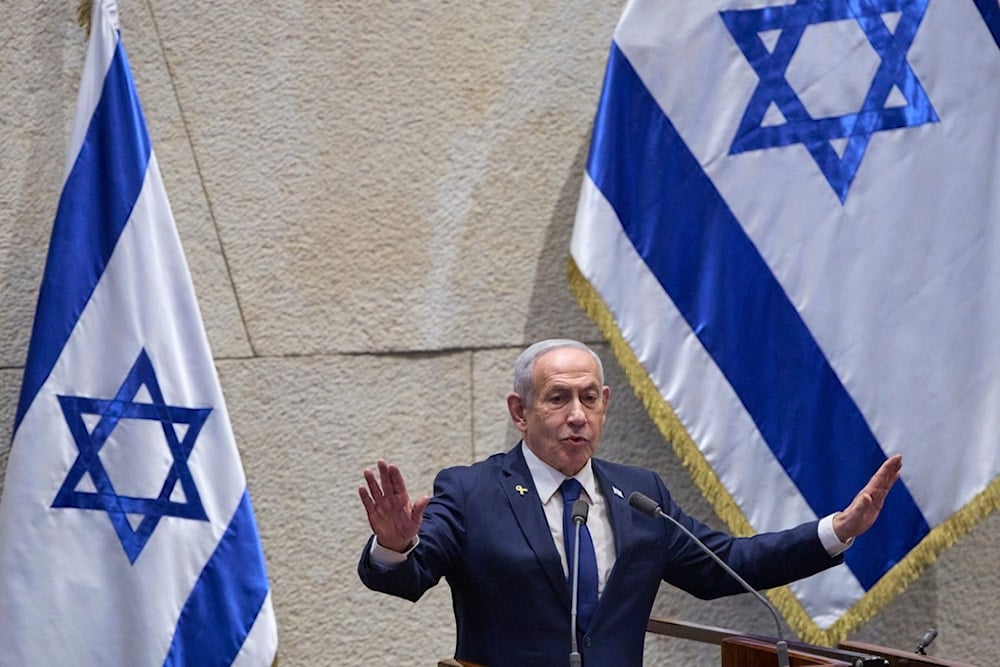Netanyahu rejects Palestinian state as condition for Saudi deal
Netanyahu says normalization with Saudi Arabia cannot be linked to a Palestinian state, as he highlights US military guarantees and claims the fiercest phase of the war on Gaza is over.
-

Israeli Prime Minister Benjamin Netanyahu addresses lawmakers in the Knesset, in occupied al-Quds, occupied Palestine, Monday, November 10, 2025 (AP)
Israeli occupation Prime Minister Benjamin Netanyahu expressed optimism on Thursday about a possible normalization agreement with Saudi Arabia, while insisting that such a deal must not be linked to the establishment of a Palestinian state.
In an interview with an Israeli outlet, Netanyahu suggested that normalization could move forward without concessions toward Palestinian statehood. He indicated that even if the process demanded it, “there will be no Palestinian state,” yet still spoke of optimism about “the normalization opportunity,” saying: “not everything said outside is said inside.”
US commitment to maintaining Israeli military edge
Netanyahu said US Secretary of State Marco Rubio assured him that Washington will preserve the Israeli occupation’s military superiority, particularly regarding the sale of F-35 fighter jets to Saudi Arabia. He noted that “there is also a practical aspect to the issue.”
Netanyahu added that the Israeli occupation strongly opposes any sale of F-35 jets to Turkey, unlike Saudi Arabia, claiming that the likelihood of the US supplying such jets to Ankara is “very low, if at all.”
Saudi Crown Prince Mohammed bin Salman had told US President Donald Trump during a meeting in Washington two days ago that Riyadh seeks to join the so-called “Abraham Accords,” while emphasizing the need to secure “a path toward a two-state solution,” asserting that Saudi Arabia “wants peace for Israel and for the Palestinians.”
Trump, for his part, said the US will sell F-35 jets to Saudi Arabia under a similar arrangement already in place with the Israeli occupation.
Netanyahu claims most intense phase of war has ended
Regarding the ongoing war on Gaza, Netanyahu claimed that the “most intense phase of the war has ended,” adding: “We can return to fighting in any sector.” He asserted that the storming of Gaza City “is what led to the release of the hostages.”
He also said the Rafah crossing would reopen for departures “after exhausting the recovery of hostage bodies,” calling on Egypt to “allow Gaza residents to leave the Strip” through the crossing.
More than 69,500 Palestinians have been killed and over 170,000 injured since October 2023 as the Israeli occupation continues its military assault on the Gaza Strip.
On Syria, Netanyahu stated: “It is better to reach an agreement,” while insisting that the occupation’s “principles of protecting our borders and our friends will remain, with or without an agreement.”
According to Israeli and Western reports, the occupation has been seeking a security arrangement with the transitional authority in Damascus that could eventually evolve into normalization, with several meetings already held between officials from both sides.
Internal crisis and military recruitment goals
Amid ongoing internal tensions, Netanyahu revealed that he has set a target of 17,000 conscripts from the ultra-Orthodox community over the next three years, in an attempt “to reach an agreement with most elements of the system.”
He also promoted what he called a “strategic shift,” presenting a decade-long plan to build an independent arms-production capability and minimize reliance on the United States or any external actor.
Netanyahu also addressed political controversy in the United States, saying he still intends to visit New York, “despite the statements of Mamdani.”
Newly elected New York City mayor Zohran Mamdani recently said in an interview that he would do everything possible to enforce the international arrest warrant issued against Netanyahu if he visits the city, even in the context of attending the United Nations General Assembly.

 4 Min Read
4 Min Read









